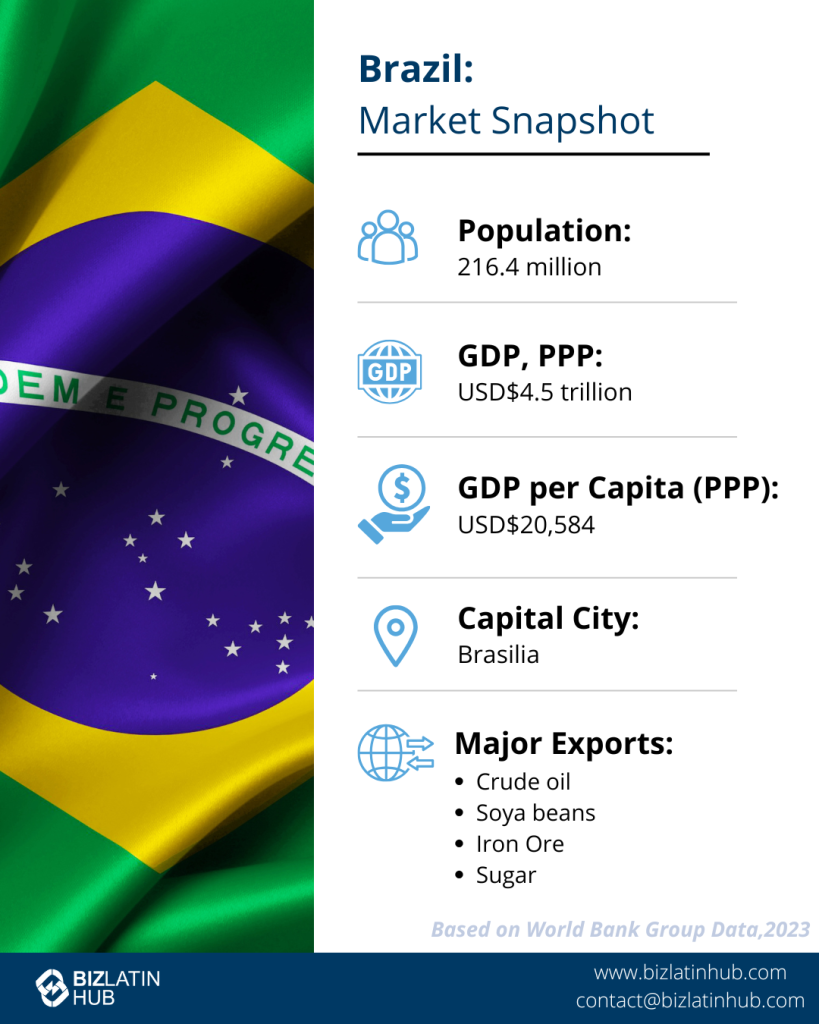
Company Formation in Brazil: Incorporation Guide for Foreign Investors
Choosing to start a company in Brazil offers significant opportunities but also comes with challenges, requiring a strong understanding of local regulations. While recent reforms have simplified market access, forming an company in Brazil still demands careful compliance with the Receita Federal do Brasil (Federal Revenue Service) and the Junta Comercial (Trade Board).
Biz Latin Hub provides expert guidance and a full suite of back-office services to help investors overcome obstacles and succeed in Brazil’s thriving business landscape. This guide details the steps, legal entity options, and requirements so you can focus on growing your business.
Key Takeaways on Company Formation in Brazil
| Is Foreign Ownership Permitted in Brazil? | Foreign nationals are allowed to set up a business in Brazil with 100% ownership. |
| Starting a Business in Brazil, Step by Step: | Step 1: Due diligence to ensure preparedness. Step 2: Grant power of attorney to your local legal representative. Step 3: Register the articles of incorporation. Step 4: Register with the public authorities. Step 5: Register with the Brazilian Central Bank. Step 6: Opening a bank account in Brazil for your company. |
| What Are The Main Types of companies in Brazil? | Limited Liability Company (Sociedade Limitada / SRL). Limited Liability Corporation (Sociedade Anônima / SA). A new branch of an existing company. Consortium |
| Why Set-up a Business in Brazil? | Starting a business in Brazil can be a straight forward process, with well established trade agreements and entry to Latin America’s largest economy. |
| What Documents Do You Need For Company Registration in Brazil? | A name for your legal entity. Shareholder identification documents. Intended business activities and corporate purpose of the company. Proof of funds for the minimum initial capital |
How to Incorporate a Company in Brazil – Step-by-Step Guide
Here we outline the process of incorporating a Limited Liability Company in Brazil. To operate locally, companies must complete six principal steps for the entity incorporation process. It should take 4-8 weeks if all documents are in order and there are no bureaucratic delays.
Here are the six steps to incorporate a Brazilian Sociedade Limitada (Ltda.):
- Step 1: Due diligence to ensure preparedness.
- Step 2: Grant power of attorney to your local legal representative.
- Step 3: Register the articles of incorporation.
- Step 4: Register with the public authorities.
- Step 5: Register with the Brazilian Central Bank.
- Step 6: Opening a bank account in Brazil for your company.
1. Due diligence to ensure preparedness
Before formally starting the incorporation process, you must gather the necessary information for every step in the process. Incorporating a company in Brazil requires a lot of documentation and company information. This includes the type of legal entity, the number of shareholders, and the minimum capital, among others. It is critical to ensure all the information is clear so the remainder of the process will run smoothly.
2. Grant power of attorney to your local legal representative
Where the shareholder/s are foreign persons or legal entities, there is a requirement to secure a Cadastro de Pessoas Físicas (CPF), which is a Brazilian Tax ID. This allows them to register within the Entity Articles of Association before the Board of Commerce.
3. Register the articles of incorporation
Your POA should have access to all necessary information and submit the required documents – known as the articles of incorporation – to the Trade Board. These should include entity and company names, a business address, capital, shareholder and administrator information, and descriptions of company activity. The cost associated with registering the articles of incorporation depends on the local home state.
4. Register with the public authorities
The next step when forming a company in Brazil is to register the company with various authorities. This includes the Federal Revenue Bureau (Receita Federal do Brasil), the relevant municipal authority, and the state authority if applicable. Depending on the nature of your business and the activities of your employees, you might also need to register with other parties. In some cases, registering with labor unions is required as well.
5. Register with the Brazilian Central Bank
Registering the company’s taxpayer number with Banco Central do Brasil is mandatory for all foreign investors. The taxpayer number (CNPJ) is the essential reference number for any company and is a requisite. To obtain the taxpayer number, the company must first register with the National Registry of Legal Entities (Cadastro Nacional da Pessoa Juridica).
6. Opening a bank account in Brazil for your company
The last step to incorporating a company is opening a bank account in Brazil. This can be complex and time-consuming, due to extensive ‘know your customer’ procedures. From our experiece this process can take anywhere from a few days to up to three months. It depends on your relationship with the bank and your financial situation. To open a bank account, your company must have shareholder documents, the incorporation articles, and a taxpayer ID.

5 Key Things to Know Before Starting LLC Formation in Brazil
With a GDP of USD $2.126 trillion, Brazil stands as Latin America’s largest economy and offers immense potential for investment. Before incorporating a company in Brazil, you must familiarize yourself with the formal process and your business needs. For example, a subsidiary company is different to a branch office. The former is easier to set up than the latter.
- By law, any foreign company can be a partner, investor, or shareholder in a Brazilian company, making the Brazilian company a subsidiary of the foreign entity: The Brazilian company will then be a legal entity having the same rights and responsibilities as any other company. The process of opening a branch, however, can be complicated. This process requires specific authorization from the Brazilian Ministry of Development, Industry, and Foreign Trade.
- Meeting the requirements for company ownership: To open a limited liability corporation, you must have at least one shareholder, but rules may differ depending on company type. Brazilian residents must represent foreign shareholders in Brazil.
- Incorporating a company comes with no formal investment requirements: However, investment is needed to qualify for the permanent Brazilian investor visa, usually for R$500,000. A Brazilian Central Bank (Banco Central do Brasil) registration is also required.
- All companies in Brazil must have a unique registered fiscal address: This address must represent a physical location; it cannot be virtual.
- Other aspects to consider: LLC formation in Brazil includes the requirement that companies have a local administrator and have commercial and company names.
Types of Companies You Can Register in Brazil

The country has different types of company, so you should know the options for company formation in Brazil in order to choose the one that best fits for your needs.
- Limited Liability Company (Sociedade Limitada / SRL).
- Limited Liability Corporation (Sociedade Anônima / SA).
- A new branch of an existing company.
- Consortium
Structure 1 – Limited Liability Company (Sociedade Limitada / SRL)
One of the most common company types in Brazil is the limited liability company, known locally as a limited society (sociedade limitada), Ltda, or SRL. This type of legal structure in Brazil is similar to a limited liability company (LLC) in the United States.
A key benefit to the limited liability company in Brazil is that each shareholder’s responsibility is tied to their assigned capital — or based on their investment. Hence, the liability of each shareholder is limited to the value of their shares, but all shareholders are jointly liable for the payment of the share capital.
Structure 2 – Limited Liability Corporation (Sociedade Anônima / SA)
Limited liability corporations, locally referred to as an anonymous society (Sociedade anônima) or SA, are closest to what’s known as a Subchapter C Corporation in the United States.
This legal structure in Brazil can issue different classes of shares (voting and non-voting) while liability among shareholders is limited to the payment of shares to which the shareholders have subscribed.
Corporations can be public (known as a Sociedade por Ações Aberta) or private (known as a Sociedade por Ações Fechada), meaning the shares and securities will not be available to the general public. Corporations seeking to raise funds often use this type of entity.
Entity Structure 3 – Opening a new branch
When choosing a Brazilian company structure, it’s worth considering the possibility of incorporating a branch. However, this process can be lengthy and costly, taking up to six months to complete, and may involve higher costs than other types of company formation.
To open a branch office in Brazil, you need to demonstrate the existence of a legal entity in another jurisdiction, including the articles of incorporation and a list of shareholders. All documents must be officially translated, legalized (notarized or equivalent), and certified by a Brazilian consulate.
Entity Structure 4 – Consortium
A consortium is the gathering of corporations of other companies to perform a particular operation or activity. Consortiums are unincorporated entities where two or more members engage in trade, business, financial operations, or ventures and share profits.

Comparison between SRL and SA in Brazil
| SRL Company | SA Company | |
|---|---|---|
| Minimum Shareholders | 1 (can be individuals or legal entities, including foreign ones) | 2 (can be individuals or legal entities, including foreign ones) |
| Non-resident Representation | A local representative | Must have a local representative |
| Board Structure | Minimum of 1 director | Minimum of 1 elected member (board of directors) |
| Operational Duration | Indefinite | Indefinite |
| Shareholder Liability | Only to their share value; jointly liable for share capital | Only to the price of acquired shares |
| Capital Composition | Cash, movable/immovable property (divided into quotas) | Cash, movable/immovable property (divided into shares, with possible classes) |
| Regulatory Complexity | Simple (changes via amendments to articles of association) | More complex (changes via shareholders’ meeting minutes) |
Biz Latin Hub generally recommends the Ltda as the most common and most flexible option available for foreign investors
Brazil Company Registration Requirements for Foreign Businesses
It’s crucial to understand what the minimum requirements are for LLC formation in Brazil before you start the process. Below is a detailed list of requisites.
- Minimum of (1) shareholder, either legal entities or individuals, national or foreign. Non-resident shareholders must have a local representative.
- Contribute a minimum initial capital of USD$500. – Important Note: Based on our experience, we recommend a minimum initial capital commensurate with your planned activities.
- Appoint a legal director within the bylaws of the company, this can be a lawyer, the company founder, and/or a senior executive within the company.
- Register a fiscal address which must be within the country and used for official correspondence.
- Open a local corporate bank account.
Important tips: The founding shareholders do not need to physically travel to the country as LLC formation in Brazil can be completed via a power of attorney.
All documents must be kept in Portuguese
What do you need to get started with your LLC formation in Brazil?
To proceed with incorporating a company in Brazil, you will need to provide the following:
- A name for your legal entity.
- Shareholder identification documents.
- Intended business activities and corporate purpose of the company.
- Proof of funds for the minimum initial capital
Important Tip: We always recommend having a preferred legal name and two alternatives in case the primary legal name is unavailable.
Bank account setup for company formation in Brazil
When you apply for a corporate bank account in Brazil, you will be asked to provide a number of official documents. These may be company documents or personal documents for the person in charge of the account. The exact list of required documents varies by provider, but there are some that every bank asks for. Here is a list of documents you should be prepared to provide when opening a corporate account in Brazil:
- Corporate national tax ID (CNPJ).
- Company’s articles of incorporation/statutes.
- Chart with the company’s shareholding structure chart with full disclosure of UBOs (Ultimate Beneficial Owners).
- Additional documents regarding UBOs may be required.
- The company’s legal representative’s personal documents, including: Personal ID (RG/RNE) and Individual Tax ID (CPF), proof of residence.
Brazil has many banks for your business to choose from. Ultimately, the best choice for your business will depend on your specific needs. Different banks will have different initial capital requirements linked to both the state you are operating in and the specifics of your company. Here is a list of some popular banks in Brazil:
- Itaú.
- Banco do Brasil.
- Banco Bradesco.
- Caixa Economica Federal.
- Santander.
- Brazilian Development Bank.
- Banco Safra.
- BTG Pactual.
- Banco BV.
- Banrisul.
- Citibank.
Tax overview for company formation in Brazil
When incorporating a company in Brazil, several crucial tax considerations must be kept in mind. Tax return extensions are not possible and an annual paper tax return must be filed before the last working day of April each year. Corporate income tax rate averages at 34%, contingent on turnover, Federal tax on domestic and foreign products is levied at 1.65% and Federal and state VAT taxes apply to various products and services, with rates varying between 7% to 25% depending on the state. This will change in 2026.
Brazilian accounting standards require companies to prepare their financial statements in Portuguese and accordance with Brazilian Accounting Norms (NBC), formerly known as Generally Accepted Accounting Principles (GAAP). Accounting records and statements must be made in Portuguese. In Brazil, all companies must follow the Brazilian Accounting Norms (NBC TG; NBC TG 1000; ITG 1000), within the IFRS standards, according to the size of the company.
Key points on taxation in Brazil
- Federal Corporate Tax: 15% + 10% surtax
- Social contributions: CSLL, PIS, COFINS
- State tax (ICMS), municipal tax (ISS)
- Mandatory monthly filings to Receita Federal
FAQs for company formation in Brazil
Answers to some of the most common questions our clients ask us about company formation in Brazil.
1. What is the process to incorporate a company in Brazil?
The incorporation process in Brazil includes selecting a legal entity type (most commonly a Limitada), preparing and notarizing the articles of association, registering with the local Board of Trade (Junta Comercial), obtaining a CNPJ (tax ID) from the Federal Revenue Bureau (Receita Federal), and enrolling in municipal and state tax systems if applicable.
2. What types of companies can foreign investors register in Brazil?
The two most common entities are the Sociedade Limitada (LTDA), a private limited company, and the Sociedade Anônima (SA), a public corporation. Foreign investors most often choose the LTDA structure due to its simpler governance and full foreign ownership allowance.
3. How long does it take to register a company in Brazil?
The company formation process in Brazil typically takes 4 to 8 weeks, depending on the location, required documents, and bank onboarding. The process is bureaucratic and requires Portuguese-language documents.
4. What are the requirements to open a company in Brazil?
Foreign shareholders must appoint a Brazilian resident legal representative, obtain a CPF/CNPJ number, and provide notarized and apostilled documents. A registered address, local bank account, and articles of association in Portuguese are also required.
5: What are the tax implications for companies in Brazil?
Companies are subject to federal corporate income tax (15% base rate + 10% surtax on profits exceeding BRL 240,000/year), social contributions, and indirect taxes such as PIS, COFINS, and ICMS (state-level VAT). Monthly and annual filings are mandatory.
Contact our team for help with company formation in Brazil
Many of these procedures may appear difficult, but numerous resources are available to help. Careful organization during these steps will help smooth the process. Many businesses opt for professional help and guidance from local experts to ensure success.
At Biz Latin Hub, our professionals can guide you and your business through these rules, regulations, and processes. With the help of our office in Sao Paulo, your company will be registered in Brazil and ready for business in no time. Extensive experience in company registration, legal, financial, and company representation sectors makes Biz Latin Hub Latin America’s leading provider of back-office services.
Please contact us today to learn more about the Brazilian economy, the business opportunities to form a company in Brazil, and how you might take advantage of these political shifts. Read about our team and expert authors on our team page.





